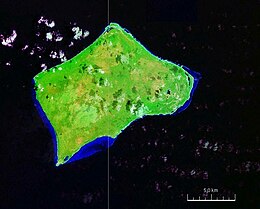Little Inagua is a small remote island in the Bahamas. It is the largest uninhabited island in the Caribbean and has no fresh water.[1] The island remains in an undisturbed and natural state.[2]
 Satellite image of Little Inagua, Bahamas | |
| Geography | |
|---|---|
| Location | Atlantic Ocean |
| Coordinates | 21°30′N 73°00′W / 21.500°N 73.000°W |
| Archipelago | Lucayan Archipelago |
| Area | 50 sq mi (130 km2) |
| Administration | |
| Demographics | |
| Population | 0 |
| Additional information | |
| Time zone | |
| • Summer (DST) | |
| ISO code | BS-IN |
In 2002, the Bahamas Government designated it as Little Inagua National Park.[1] The park is approximately 31,600 acres and its designation extends into the marine area to 100 fathoms.[3] The park holds a wide variety of reptiles, birds, wild goats, and donkeys.[4] Additionally, the island is a nesting location for a critically endangered sea turtle species.[1]
On July 27, 2017, the U.S. Coast Guard and the Royal Bahamas Defence Force rescued six Haitian migrants from the island.[5]
See also
editReferences
edit- ^ a b c "Little Inagua National Park". The Bahamas National Trust. Retrieved 15 August 2023.
- ^ "Unprecedented Expansion of National Park System" (PDF). Currents. Bahamas National Trust. June 2002. p. 4. Retrieved 4 January 2019.
- ^ "LITTLE INAGUA NATIONAL PARK". The Islands of the Bahamas. Bahamas Ministry of Tourism. Retrieved 15 August 2023.
- ^ "Things to Do in Great Inagua". Frommer. Retrieved 15 August 2023.
- ^ "Coast Guard, Royal Bahamas Defence Force rescues 6 Haitian migrants off Little Inagua". Coast Guard News. 29 July 2017. Retrieved 15 August 2023.
